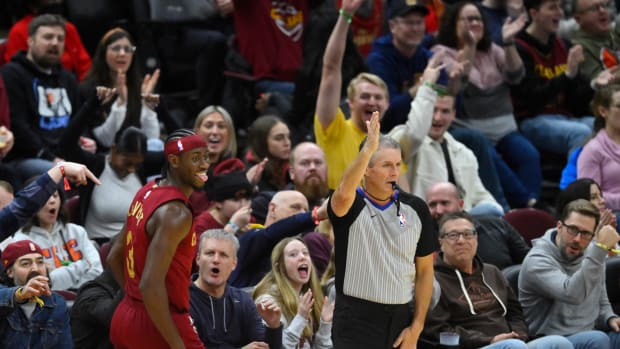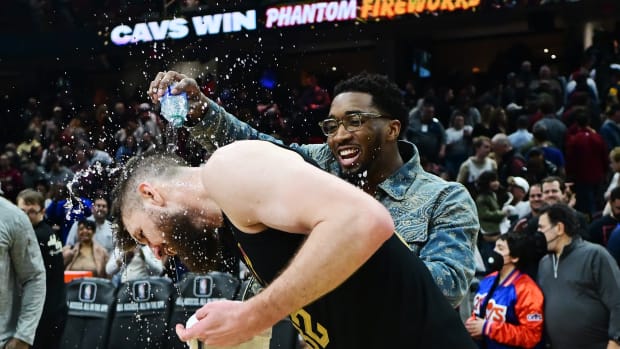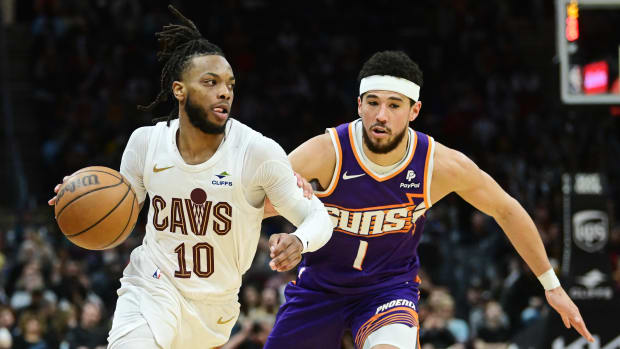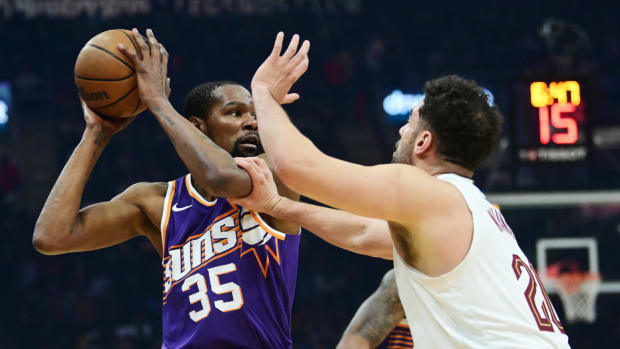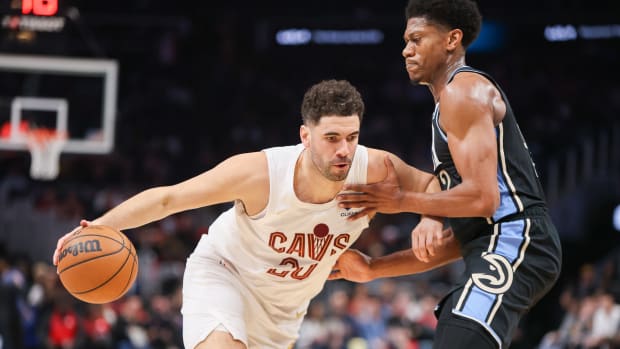Roth: Rockets' red glare would be dealing for LeBron
Last season, the Houston Rockets, with Chris Paul and James Harden at the helm, were very good. Despite losing to the Warriors in Game 7 of the Western Conference Finals, Houston finished first in the Western Conference during the regular season.
If Paul hadn’t injured his hamstring in the final minute of Game 5 of the series against the Warriors, there is a very good chance the Rockets would have won the series and gone on to win the NBA championship. Injuries are a part of the game, though, and one play can change an entire playoff series.
Despite the disappointing postseason exit, the Rockets showed they are serious contenders, and are quite possibly the only team that has the ability to beat the Warriors. Provided the Rockets resign the core of their team and everyone stays healthy, it is certainly possible for them to knock the Warriors out of the playoffs next season. With that being said, however, Houston could tremendously boost its odds of winning an NBA title next season if they are able to add one last piece to the puzzle: LeBron James.
Heading into the 2018-19 season, the Houston Rockets have a total of $78,887,985 committed in player salaries. As with the Lakers, while that amount is certainly less than the projected 2018-19 salary cap of $101 million, the Rockets will be over the cap because of the organization’s sizeable $65,505,421 in cap holds; a total of $65,382,680 of that amount is from free agents and the remaining $122,741 is due to Troy Williams, who Houston waived in February of the previous season to create a roster spot for Joe Johnson (in a nutshell, the amount due to Williams represents a portion of the guaranteed salary remaining on his contract at the time he was waived).
Unlike the Lakers, however, there is no doubt that the Rockets want, need, and should resign several of their free agents, and it’s no secret that their top priority on that front is Paul.
In the 2017-18 season, with Paul helping steer the ship, the Rockets won a total of 10 more games than they did in the previous season, and not only advanced one round further than they did in the 2016-17 playoffs, but also came within inches of winning the Western Conference Finals.
According to ESPN, in the 2017-18 season, Paul’s real-plus minus for wins, which provides an estimate of the number of wins a player has contributed to his team’s win total for a season, was 11.75, so there is certainly a strong argument that those extra 10 wins and the success in the playoffs were directly attributable, at least in part, to Paul’s presence (Harden, without a doubt, was also clearly amazing, which is why he is the 2017-18 regular-season MVP).
Nevertheless, in order to keep Paul, the Rockets are probably going to have to shell out some serious dough. The maximum amount Paul can receive for his first-year salary in a new contract is $35,350,000. Although Paul can certainly agree to take less, I wouldn’t make any wagers on it. As I mentioned in the article on the Los Angeles Lakers, Paul already made that sacrifice the year prior in order to make his trade from the Los Angeles Clippers to the Rockets work, most likely with the verbal or unspoken understanding that the Rockets would max Paul out when he became a free agent the following year. Recent reports regarding Paul’s willingness to accept anything less than a max contract seem to confirm as much.
Assuming the reports are correct, what is unclear at this point is whether Houston’s reluctance stems from Paul’s age (Paul is currently 33 and a max contract would amount to $205,030,000 over five years, which would make him 37 at the beginning of the last year of the contract), or if it has more to do with the Rockets’ new owner not wanting to spend the money.
Either way, it shouldn’t matter. If the Rockets are committed to winning an NBA championship sooner, rather than later, they need to re-sign him, which means ponying up with a max deal. Delaying making a max offer to Paul after the start of free agency will only serve to strain the relationship between him and the team and unnecessarily irritate him; the Rockets front office is well aware of that fact, so don’t be surprised if Houston makes him a max offer on or soon after July 1.
Assuming Houston signs Paul to a max deal, the organization will have a total of $114,360,726 committed to player salaries for the 2018-19 season, well over the 2018-19 projected salary cap of $101 million (the Rockets could and probably will waive Zhou Qi from the active roster since his salary for the 2018-19 season is non-guaranteed, but doing so would only reduce the team’s committed salaries to $112,982,484 and won’t have any effect on whether the organization is over or under the salary cap). As a result, at that point, the Rockets would only be able to sign players using exceptions and minimum salaries, which means they won’t be able to ink James as a free agent.
The Rockets do, however, have the ability to acquire LeBron through a sign-and-trade transaction, but it wouldn’t be easy and would require some significant sacrifices. In order for a sign-and-trade deal between Houston and Cleveland which sends James to the Rockets to work, there are a number of things that need to happen.
First, LeBron would need to ask for the sign-and-trade. For the most part, the only real sacrifice he would have to make in order to make a sign-and-trade work (with any team) is being willing to take a little less money than he could otherwise earn if he stayed with the Cavaliers (resigning with the Cavaliers, LeBron could sign a deal worth approximately $205,030,000 over five years, but only $152,005,000 over four years if he agrees to a sign-and-trade).
Obviously, no one knows what’s really going on in LeBron’s mind except for LeBron, however this is probably the easiest piece of the puzzle. Houston was not just good this past season, it was excellent. The Rockets were easily the second-best team in the League last year, and it is certainly possible to make an argument that they were just as good as Golden State. Again, if Paul hadn’t injured his hamstring, the Rockets may have sent the Warriors packing. Moreover, provided the Rockets resign Paul and keep the core of their team together, they will likely remain as one of the only serious threats to the Warriors dynasty for the foreseeable future.
If James wants to win more NBA championships now, the Rockets are his best bet. The team is already built to win NBA championships, and has proven it can challenge the Warriors. Adding James to the mix would make them an even bigger threat. Part of what makes the Warriors so lethal is the number of weapons they have at their disposal. Any given night, the Warriors can rely on Steph Curry, Kevin Durrant, Klay Thompson, Andre Iguodola or Draymond Green to win a game.
If more than one of them is clicking, which is typically the case, they become extraordinarily difficult to beat, no matter how well their opponent is playing. As of right now, only a few combinations of players have the ability to rival the Warriors, and since James and Kyrie Irving aren’t likely to team up again any time soon, a superteam consisting of James, Harden and Chris Paul is at the top of the list.
With respect to the second component necessary to make a sign-and-trade deal for LeBron work, as is the case with any team, the Rockets need to have something that Cleveland wants and/or could use in the future (i.e. players and/or draft picks). Unfortunately, this is where it starts to get a little more challenging.
Although Houston certainly has some players that would interest Cleveland, the vast majority of them are players the Rockets would not want to trade. Clearly, Harden is off limits, as is Paul (assuming Houston resigns him). After taking Harden and Paul out of the conversation, the only players left that would potentially peak Cleveland’s interest, are Ryan Anderson, Eric Gordon, P.J. Tucker, Clint Capela and Trevor Ariza.
Anderson, Gordon, and Tucker are certainly options, but Capela and Ariza are different stories. Ariza is an unrestricted free agent, so the only way Houston would be able to include him as a part of a trade would be if he agrees to a sign-and-trade. Since a sign-and-trade doesn’t enable Ariza to receive any additional guaranteed money or a longer contract than he could otherwise get on the open market, he has little incentive to agree to one. Therefore, Ariza is probably out of the picture.
In terms of Capela, even putting aside the fact that the Rockets want to keep him, because he is a restricted free agent, moving him as a part of any trade deal would be extraordinarily difficult. Essentially, similar to Ariza but for different reasons, in order for the Rockets to include Capela in any trade, Capela would have to sign off on the transaction, and doing so would basically require him to agree to take less money than he will otherwise likely be able to command from the Rockets or another team either this year or next. Therefore, Capela is also out of the picture, which leaves only Anderson, Gordon, and Tucker as the potential trade assets in any deal with Cleveland. Whether it makes sense or not for Houston to give up Anderson, Gordon, and/or Tucker in exchange for James is another issue all together.
Provided Cleveland is interested, and Houston is willing to part with Anderson, Gordon, and/or Tucker, the trade would still have to work under the NBA Collective Bargaining Agreement trade rules. If LeBron won’t accept a contract that contains a first-year salary that is less than the maximum he is eligible to earn (i.e. $35,350,000), the bare minimum amount of salary the Rockets would have to move away would be $28,200,000.
Collectively, Anderson, Gordon and Tucker are set to make a total of $41,891,458 in the 2018-19 NBA season, so the Rockets have more than enough to make a deal legal from their standpoint. Also, the combination of either Anderson and Gordon, or Anderson and Tucker would be valid, so it wouldn’t be necessary to trade all three players.
At the same time, however, Cleveland would be able to accept up to $44,287,500, so it’s possible the Cavaliers would demand all three players (and potentially draft picks and/or cash). Obviously, the downside to Houston doing a sign-and-trade to acquire LeBron is that they would have to give up a number of players that played an integral role in the organization’s success this past season. To that end, there is always a significant risk that moving Anderson, Gordon, and/or Tucker could materially alter the team’s chemistry and leave the team worse off than before the trade.
In almost any other situation, it wouldn’t even be worth Houston considering, but given that the organization would be acquiring the best player in the NBA in his prime, it may just be worth it, especially when you take into account the potential damage Harden, James, and Paul could collectively inflict on other teams. Once you add Capela and some solid supporting cast members and the fact that you could lock LeBron in for four years and Paul for five years, any risk starts to shrink considerably.
There is no doubt acquiring LeBron won’t be easy for Houston, but it would be a mistake for the organization not to try. One thing that Houston certainly has going for it, in addition to James’ desire to win more NBA championships, is Lebron’s close relationship with Paul and his desire to play with him.
Beating the Warriors in a playoff series is going to take a tremendous amount of talent, and despite how amazing Houston was last season, regardless of the reason, the Rockets couldn’t seal the deal when it mattered most. If the Warriors stay together, it’s going to take another superteam to defeat them; a team with Paul, Harden and James may just do the trick.
ABOUT THE AUTHOR —Steven Howard Roth is an attorney in Cleveland, representing clients in mergers and acquisitions, commercial real estate transactions, banking and finance matters, and business start-ups. Steven holds a JD and an MBA from Case Western Reserve University, and has extensive experience in the area of sports, media and entertainment law, having worked for multiple professional sports teams, governing bodies and sports agencies, and representing athletes, artists, media personalities and Grammy -winning recording artists.
